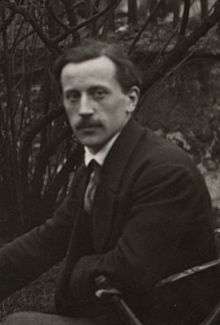Raymond Duchamp-Villon
| Raymond Duchamp-Villon | |
|---|---|
 Raymond Duchamp-Villon, c.1913, photo in the Smithsonian Institution Archives of American Art | |
| Born |
Pierre-Maurice-Raymond Duchamp 5 November 1876 Damville, Eure, France |
| Died |
9 October 1918 (aged 41) Cannes, France |
| Nationality | French |
| Known for | Sculpture |
| Notable work | The Large Horse (1914), La Maison Cubiste facade (1912) |
| Movement | Cubism |
Raymond Duchamp-Villon (5 November 1876 – 9 October 1918) was a French sculptor.
Duchamp-Villon was born Pierre-Maurice-Raymond Duchamp in Damville, Eure, in the Haute-Normandie region of France, the second son of Eugene and Lucie Duchamp. Of the six Duchamp children, four would become successful artists. He was the brother of Jacques Villon (1875–1963), painter, printmaker; Marcel Duchamp (1887–1968), painter, sculptor and author; Suzanne Duchamp-Crotti (1889–1963), painter.
Life and art


From 1894 to 1898 Raymond Duchamp-Villon lived in the Montmartre Quarter of Paris with his brother Jacques and studied medicine at the Sorbonne. Rheumatic fever forced him to abandon his studies in 1898 and it left him partially incapacitated for a time. This unforeseen event altered the course of his life as he began to pursue an interest in sculpture. He started by creating small statuettes and essentially became self-taught, achieving a high level of mastery and acumen. In 1902 and 1903, he exhibited at the Salon de la Société Nationale des Beaux-Arts but to distinguish himself from his artist brother, he began to use the Duchamp-Villon designation on all his works.
In 1905 Duchamp-Villon had his first exhibition at the Salon d'Automne and a show at the Galerie Legrip in Rouen with his brother Jacques. Two years later they moved to the village of Puteaux at the outskirts of Paris where the three Duchamp brothers were part of the regular meetings of what became known as the Puteaux Group of artists and critics. Raymond's reputation was such that he was made a member of the jury of the sculpture section of the Salon d'Automne in 1907 and was instrumental in promoting the Cubist movement.
In 1911 he exhibited at the Galerie de l’Art Contemporain in Paris and the following year his work was included in a show organized by the Duchamp brothers at the Salon de la Section d’Or at the Galerie de la Boétie. All three of the Duchamp brothers then showed their work at the important Armory Show in New York City that helped introduce modern art to America.
In 1913 he took part in exhibitions at the Galerie André Groult in Paris, the Galerie S. V. U. Mánes in Prague, and in 1914 at Der Sturm Gallery in Berlin. During World War I Raymond Duchamp-Villon served in the French army in a medical capacity, but still worked on his major cubist sculpture, The Horse.
In late 1916, Raymond Duchamp-Villon contracted typhoid fever while stationed at the military quarters in Champagne. As a result, he was taken to the military hospital at Cannes where his burgeoning career came to an end with his death.
In 1967, in Rouen, his last surviving artist brother Marcel helped organize an exhibition called Les Duchamp: Jacques Villon, Raymond Duchamp-Villon, Marcel Duchamp, Suzanne Duchamp. Some of this family exhibition was later shown at the Musée National d'Art Moderne in Paris.
Gallery
%2C_terracotta%2C_Armory_Show_postcard%2C_published_1913.jpg) Raymond Duchamp-Villon, 1910, Torse de jeune homme (Torso of a young man), terracotta, Armory Show postcard, published 1913
Raymond Duchamp-Villon, 1910, Torse de jeune homme (Torso of a young man), terracotta, Armory Show postcard, published 1913
Solomon R. Guggenheim Museum
New York City%2C_Document_du_Mus%C3%A9e_National_d'Art_Moderne%2C_Paris.jpg) Raymond Duchamp-Villon, 1912, Maquette originale de La Maison Cubiste (Cubist House, Façade architecturale), Document from Musée National d'Art Moderne, Paris
Raymond Duchamp-Villon, 1912, Maquette originale de La Maison Cubiste (Cubist House, Façade architecturale), Document from Musée National d'Art Moderne, Paris_at_the_Salon_d'Automne%2C_1912%2C_detail_of_the_entrance._Photograph_by_Duchamp-Villon.jpg) Raymond Duchamp-Villon, 1912, La Maison Cubiste (Cubist House) at the Salon d'Automne, 1912, detail of the entrance. Photograph by Duchamp-Villon
Raymond Duchamp-Villon, 1912, La Maison Cubiste (Cubist House) at the Salon d'Automne, 1912, detail of the entrance. Photograph by Duchamp-Villon Raymond Duchamp-Villon, 1912 (cast 1954), Maggy (Maggy), bronze
Raymond Duchamp-Villon, 1912 (cast 1954), Maggy (Maggy), bronze
Solomon R. Guggenheim Museum
New York City Raymond Duchamp-Villon, 1913, Le chat
Raymond Duchamp-Villon, 1913, Le chat- Raymond Duchamp-Villon, 1913, Les amants II, Musée National d'Art Moderne, Paris
%2C_photograph_by_Duchamp-Villon.jpg) Raymond Duchamp-Villon, 1914, Femme assise, plaster, 65.5 cm (25.75 in), photograph by Duchamp-Villon
Raymond Duchamp-Villon, 1914, Femme assise, plaster, 65.5 cm (25.75 in), photograph by Duchamp-Villon Raymond Duchamp-Villon, 1914 (cast ca. 1930), Le cheval (The Horse), bronze and patina
Raymond Duchamp-Villon, 1914 (cast ca. 1930), Le cheval (The Horse), bronze and patina
Solomon R. Guggenheim Museum
New York City
Publications
- Tomkins, Calvin, Duchamp: A Biography. Henry Holt and Company, Inc., 1996. ISBN 0-8050-5789-7
See also
References
- Tomkins, Calvin, Duchamp: A Biography. Henry Holt and Company, Inc., 1996. ISBN 0-8050-5789-7
External links
| Wikimedia Commons has media related to Raymond Duchamp-Villon. |
- Raymond Duchamp-Villon's Horse (video 3:49) Smarthistory
- Raymond Duchamp-Villon in American public collections, on the French Sculpture Census website
